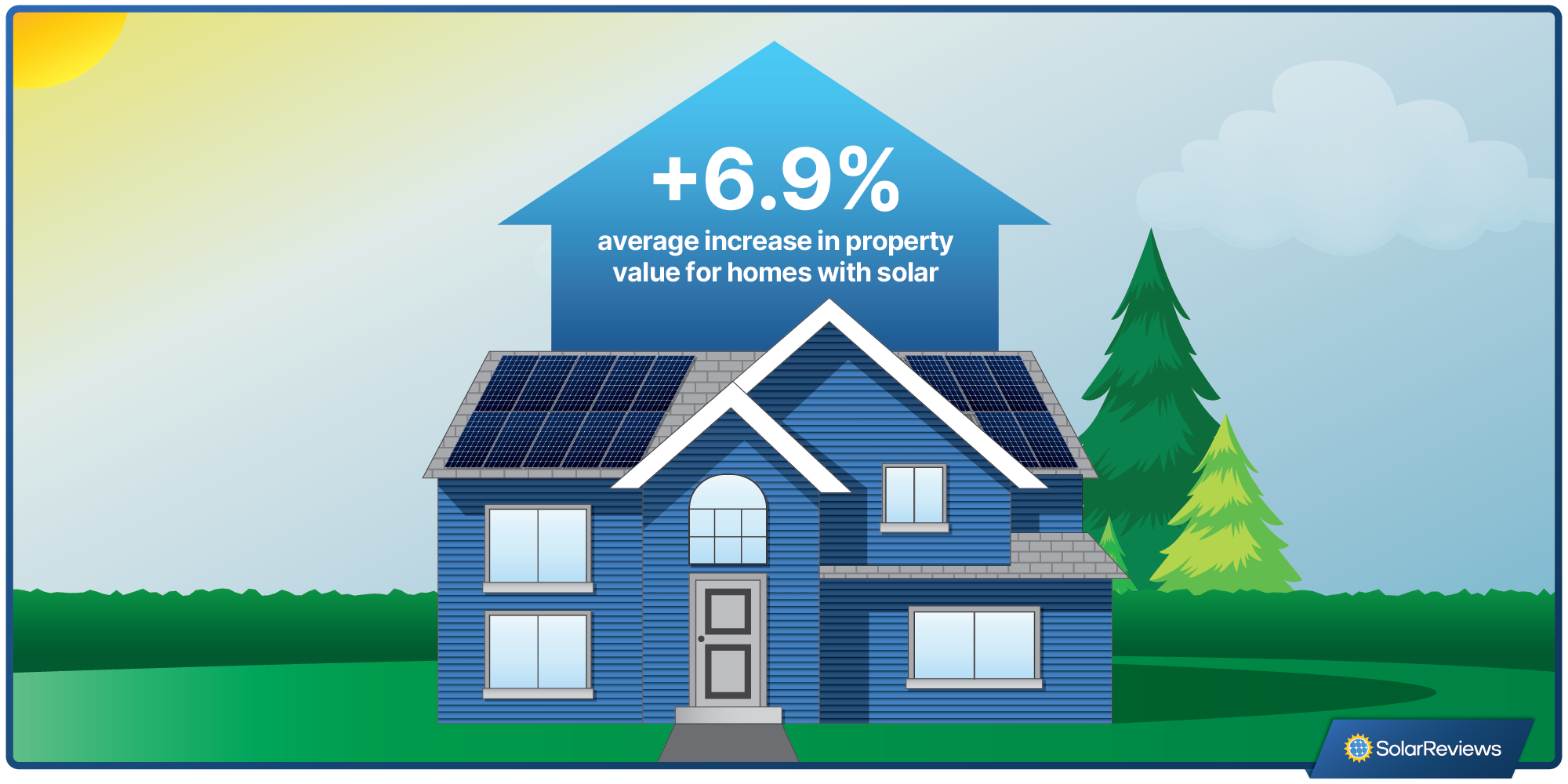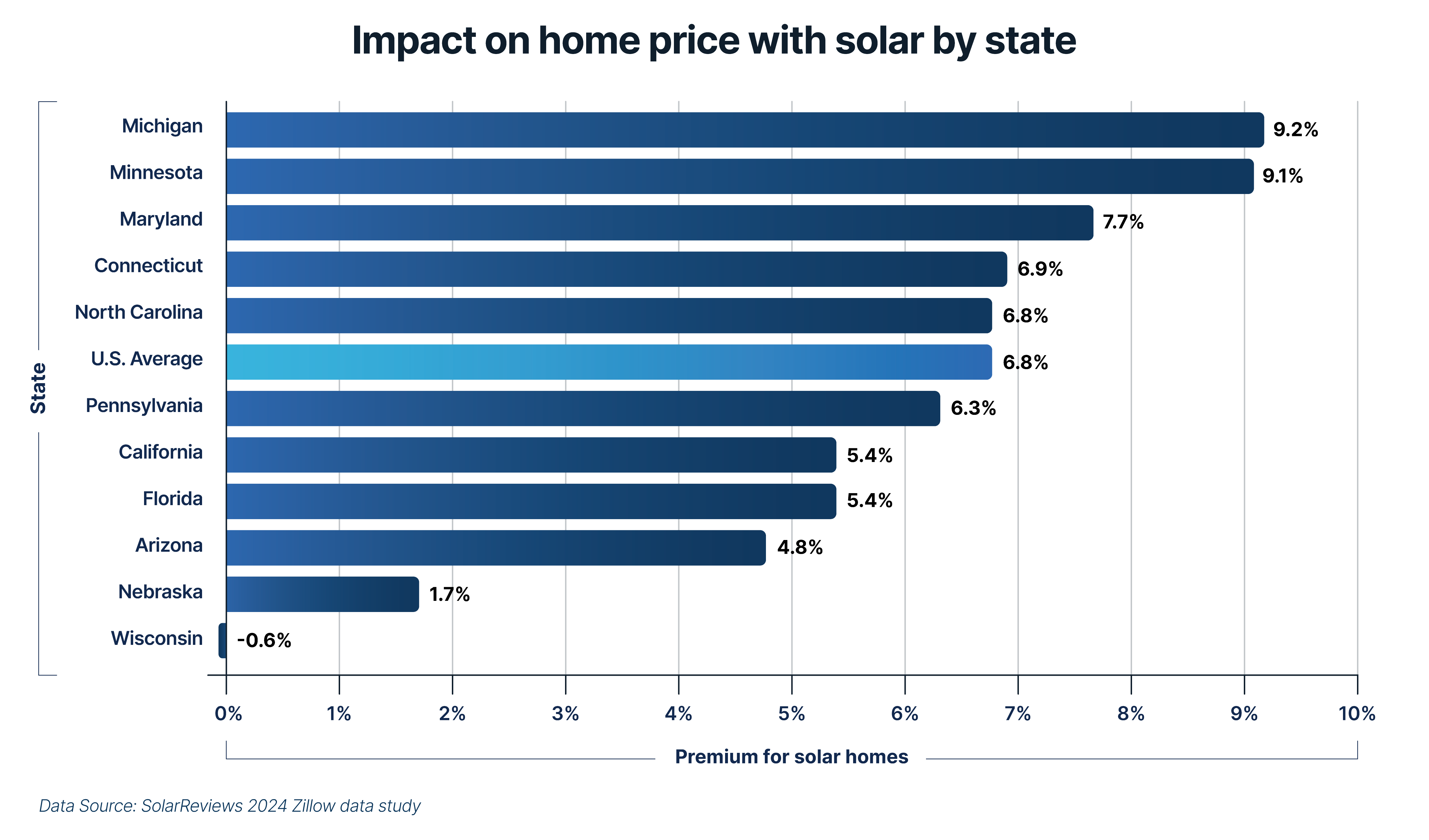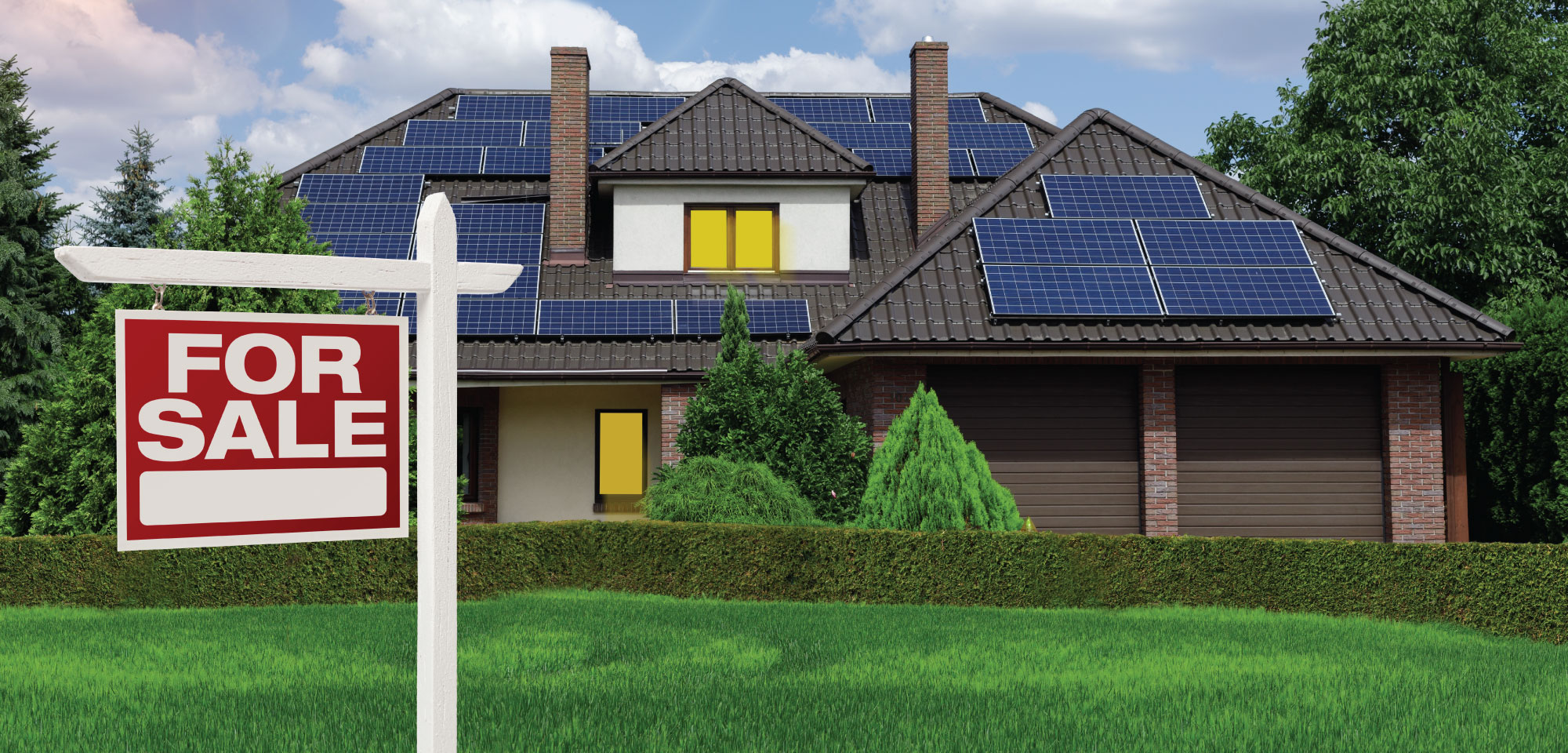Updated 1 week ago
Do Solar Panels Really Increase Your Home’s Value in 2025?
Written by Jamie Smith Jamie SmithJamie is a Content Writer and researcher at SolarReviews. A recent graduate of La Salle University in Philadelphia, Jamie earned her B.S. in communica...Learn more , Edited by Catherine Lane Catherine LaneCatherine has been researching and reporting on the solar industry for five years and is the Written Content Manager at SolarReviews. She leads a dyna...Learn more

Why you can trust SolarReviews
SolarReviews is the leading American website for solar panel reviews and solar panel installation companies. Our industry experts have a combined three decades of solar experience and maintain editorial independence for their reviews. No company can pay to alter the reviews or review scores shown on our site. Learn more about SolarReviews and how we make money.
It’s been proven that solar panels can help you save on your electricity bills – but can they add value to your home, too?
Our experts found that homes with solar panels sold for about 6.9% more on average than homes without solar in SolarReviews' 2025 solar home value study.
But, how much solar panels will increase your home’s value depends on a few factors. In some cases, solar panels might not change the value of your home at all! Let’s take a look at the ways solar panels can affect your home value.
Key takeaways
A 2025 SolarReviews study found that homes with solar panels sold for 6.9% more than homes without solar panels.
The lower monthly electric bills of energy-efficient homes with solar panels are attractive to home buyers.
Some factors that affect how much solar panels add to the market value of a home include your location, the size of the solar panel system, the system’s condition, local electricity rates, and how it was financed.
Like other home improvement upgrades, solar panels may increase property taxes, but 29 states have some form of solar property tax exemption.
How much does my home’s value increase when I install solar panels?

Homes that install solar energy systems sell for 6.9% more on average than homes without them, according to a 2025 study conducted by the experts at SolarReviews. This is an increase from the 4.1% figure found by Zillow in a 2019 study.
With the median value of a home in 2025 at around $416,900, solar panels could add nearly $29,000 in value!
Keep in mind that every home's situation is different, and several factors will impact how much solar panels increase your home’s value.
What factors determine how solar panels will affect my home value?
No two homes are the same when it comes to solar installations. That fact rings true for home value as well. Here are some factors that can influence how much value solar panels add to your home.
Location
Where you live in the U.S. can greatly impact the value of your home when you install solar panels. The region, state, and even the city you live in can make all the difference.
For example, our study found that homes with solar panels in Seattle, Washington, sold for a staggering 9.3% more on average, which is the top spot for the highest increase in home value.

It’s important to note that adding solar panels doesn’t guarantee an increase in home value. We found that solar homes in Wisconsin sold for less than non-solar homes.
California, a popular state for home solar, saw a 5.4% rise in value.
System size
A bigger solar system calls for more solar equipment and higher electricity bill savings, meaning a large solar power system could add more value to your home.
The average solar system size is about 6 kilowatts (kW), but some homes could call for much larger systems. Your home’s electricity usage, the amount of sunlight your home receives, and the wattage of the solar panels you’re using all play a role in how many solar panels you need.
Solar system condition
Solar panels are built to last 25 years or longer before they start to noticeably degrade. If you are trying to sell your home with a system at the end of its lifespan, your appraisal value may be lower.
In addition to the age of your system, its condition also impacts its value. Regular solar panel maintenance and upkeep can keep your solar system in peak working condition. Also, high-quality solar equipment from the top solar panel brands will hold up better over time and ensure access to a reliable solar warranty to cover defects, helping retain a system’s value.
Electricity prices
Another huge pro to having a solar-powered home is that it can reduce your energy bills and save you money.
According to the 2024 REALTORS & Sustainability report conducted by the Nation Association of REALTORS Research Group – 44% of homebuyers found utility costs to be an important factor to consider during the buying process, and 57% of real estate agents found promoting energy-efficient features in a home were somewhat valuable.
A home with solar panels can appeal more to a prospective buyer due to low energy costs. Buyers in areas with especially high electricity rates, like New York or Massachusetts, may be willing to spend a little extra for long-term energy savings.
Owned vs. leased solar system
There are a few different ways to pay for solar. You can buy your solar power system in cash or finance through a solar loan, solar lease, or power purchase agreement (PPA).
The selling process could be more difficult if you have a third-party-owned system through a solar lease or PPA. Potential buyers may hesitate to take on a monthly solar payment as another responsibility.
Also, because the homeowner doesn’t own the solar panel system and the solar savings aren’t as significant, it may not add as much to the overall home value as a system purchased with cash or a solar loan.
Do solar panels raise my property taxes?
If solar panels raise the resale value of your home, you may also see an increase in your property taxes.
Based on the median home value in the U.S., homeowners can expect solar panels to increase their annual property taxes by between $160 and $630. But like most things in the solar industry, everyone’s situation is unique! Actual property tax increases will vary depending on where you live, the added value to your home, and the specific solar system you install.
Property tax exemptions are offered in select states as an incentive for going solar, which prevents any increase in your property taxes when you install solar to your home. There are currently 29 states that offer property tax exemptions. To see if your state made the cut – check out our full list of states that currently offer tax exemptions in 2025.
Bottom line: Will solar panels add value to my home?
Most homeowners can expect a solar panel installation to increase their home’s value, leading to a higher home sale price.
The average U.S. home with solar panels will sell for about 6.9% more in 2025 than homes without solar panels. However, this number can be higher or lower depending on your location, local electricity prices, the condition of your solar system, and whether you own or lease your panels.
At the end of the day, it’s important to remember that raised property value isn’t the only advantage of going solar. There are plenty of other reasons going solar is worthwhile. Solar has become more affordable through the federal solar tax credit, net metering, and other local solar incentives. Not to mention – it’s a great investment in a clean energy source that can reduce your carbon footprint!
Solar panels and property value: FAQ
Will adding a solar battery affect my property value?
Solar batteries can help you reduce your electricity bills even further when you live in a state without true net metering policies.
A National Renewable Energy Laboratory (NREL) study stated that reduced utility bills can increase property value. If so, having a solar battery paired with your solar system could affect your property value. But this is likely on a case-by-case basis.
Battery storage can also provide backup power for your home in the event of a grid blackout or a power outage during a storm, which may be something home buyers would be willing to pay a little extra for.
Will my property value rise if I finance my system with a solar loan?
Solar panels can still increase your home value when financed with a loan. The original homeowner will usually pay off any remaining solar loan balance at the time of sale. While loans could be passed on to a new buyer, it is not common practice and can add time and negotiations to the selling process.
Is it hard to sell a house with solar panels?
Selling a house with solar panels is easy, especially when the panels were purchased with cash or a loan, as many homeowners value solar's low electric costs and eco-friendly benefits.
However, selling a home with solar panels financed with a solar lease or a PPA could make the selling process difficult. The problem here is these financing options come with long-term contracts. If you sell your home, the contract must either be bought out by you or transferred to the new owner. This could turn away a potential buyer unwilling to take on a monthly solar payment.
Is it a good idea to buy a house with solar panels?
If you are looking specifically to buy a house with solar panels, we recommend checking all these boxes first before making your decision:
The solar system is owned and fully paid off.
The solar panels are in peak working conditions for their age.
Double-check that the roof is in good condition for panels.
Research the solar company that installed the panels and ensure they’re still in business!
Make sure to ask if the solar panels are leased. If they are, you might have to take on a solar payment if you buy the house or negotiate for the contract to be terminated.
Will I still get rebates and incentives when I buy a house with solar panels?
You will not receive upfront rebates or tax credits when you buy a house with solar panels; the previous owner has already received those payments.
However, you will be entitled to your utility company’s net metering benefits and may be eligible for other performance-based incentives, such as SRECs. You must transfer these performance-based incentives into your name when buying a solar-powered home.
Jamie is a Content Writer and researcher at SolarReviews. A recent graduate of La Salle University in Philadelphia, Jamie earned her B.S. in communications with a concentration in journalism, mass media, and public relations. Jamie has previously worked at a marketing company where she had the opportunity to highlight and promote small business owners through long-form stories and interviews. With a deep-rooted passion for creativity, Jamie stri...
Learn more about Jamie Smith